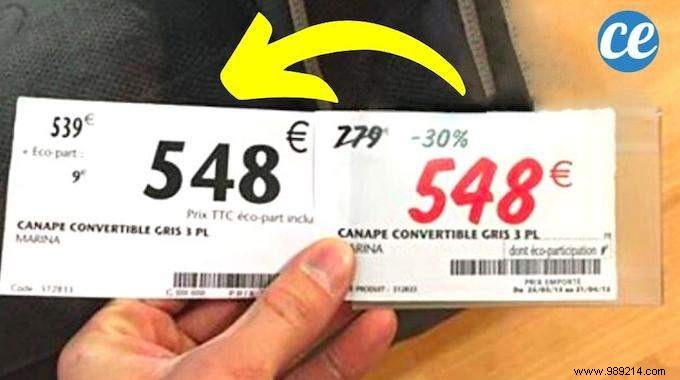
Going on sale without being fooled... It's not that simple!
Want to take advantage of the sales without getting scammed?
Me too!
After being fooled several times, I ended up asking a salesperson friend for advice.
Imagine that she was kind enough to share with me some effective tips to thwart the traps of the sales
And since then, no more scams in shops or on the Internet!
So why not you?
This is how some merchants rip you off and what to do to avoid these pitfalls.
You will finally be able to do good business in 2022. Watch:

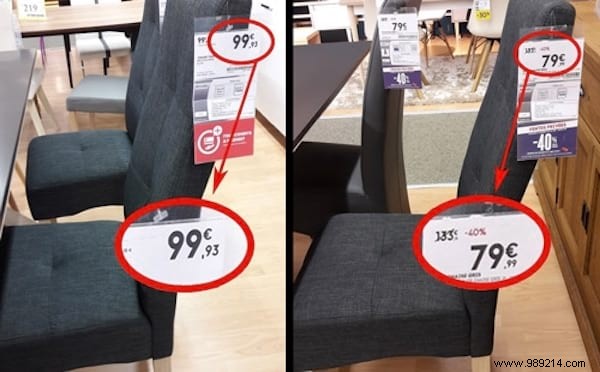
It's a classic!
How it works ? It's quite simple.
The open price displayed on the tag is inflated.
This means that it is much higher than the reference price.
Then we offer a generous discount... which in fact is not one!
A concrete example?
During the sales, these superb chairs have an original price of 133€.
They are supposedly on sale at €79.99. We say to ourselves, not bad, nice reduction, right?
Well no, because in reality these chairs cost 99.93€... before the sales!
The reduction is therefore much less.
We just inflated the original price to make believe in a super reduction.
How not to be fooled?
It is difficult for small items to know if the basic price displayed is the real one...
On the other hand, for large items, it is best to mark before.
Are you planning to buy a household appliance, an expensive sporting item, furniture, computers?
So, look at the price it costs before sales.
And if you couldn't do it, compare prices in several stores.
This will give you a good indication of the true base price.
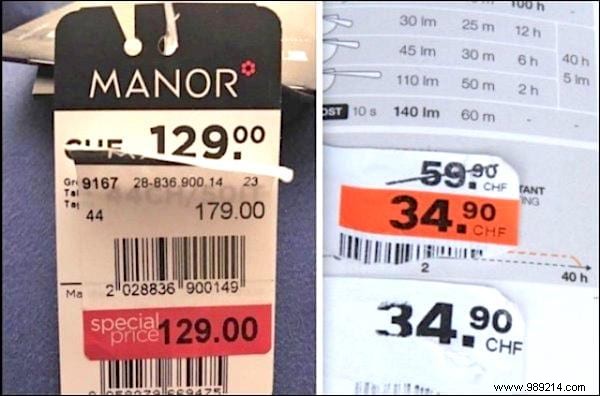
A small calculation error arrived quickly!
It's true that no one is safe...
But unfortunately, it slips in more often than you think on the labels.
An example ? A pair of pants costs 75€.
We offer you a 30% reduction, or 52.5. But the price displayed is 55 €.
Not enough to make a revolution... But hey, why pay more?
How not to be fooled?
It's very easy ! And you don't have to be a math geek.
Just use the calculator on your smartphone and recalculate the promotions that seem suspicious to you.
Even better, you can do it in your head easily with this trick here.

Up to - 50% off, -70% off!
Stores do not lack imagination to attract consumers.
And what could be better than a mega big discount to let yourself be tempted and cross the threshold of the store?
The problem is that once inside, you can't find the super promos.
And for good reason, they do not exist!
Let me tell you a good thing:
This is simply false advertising .
But caught up in the madness of the sales, we're not going to pay attention...
Or else we will be tempted by less interesting promotions.
How not to be fooled?
Keep your cool in all circumstances!
Did you enter this store for a 70% off promo?
Don't walk away with an item on sale at -10%!
Try this very effective trick:wait 2 days before giving in to the temptation of impulse buying.
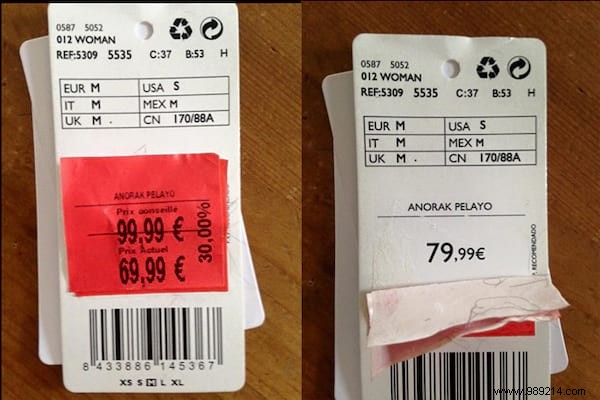
Open your eyes! A label of a discounted product must include 3 mentions :
- The open price
- The sale price
- The discount made
These three elements must be on the label for it to be compliant.
The goal is to give as much information as possible to the consumer.
How not to be fooled?
If you see a tag that doesn't match this description on a sale item, ask a seller.
It may just be an oversight.
And in general, avoid tote boxes with "everything at 10€" or "On sale" posters.
Items often don't have labels or even barcodes.
Sono tags =no purchase !
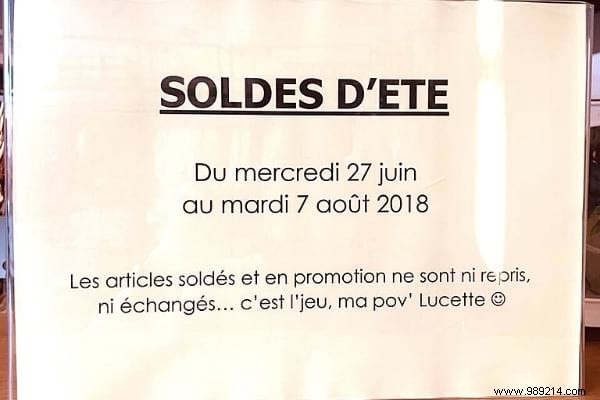
With the sales, we see a new mention popping up everywhere:"neither taken back nor exchanged"!
Be careful, there is a small subtlety to be aware of.
Know that during the sales, an article benefits from the same guarantees as any other.
Even during sales, a merchant is required to refund or exchange your item in the event of a non-apparent manufacturing defect.
On the other hand, if the garment does not fit you, or if you no longer like it, he is not obliged to exchange it.
Even if a commercial gesture is always possible!
You're probably wondering how it works for sales on the Internet?
The rules are the same for sales on the Internet as in a physical store.
But take note of this!
There is good news.
For a purchase made on the Internet during the sales period or outside, you have a 7-day withdrawal period from delivery.
This means that you can return the item without justification and get a refund.
Provided of course that it is in perfect condition.
How not to be fooled?
It is best to try on items before buying.
This way you can be sure that it fits you well.
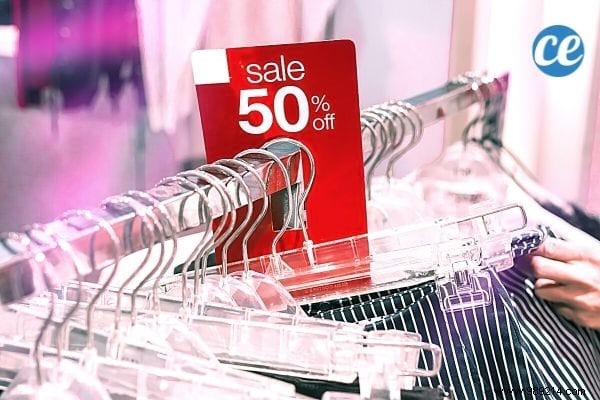
You walk into a store to buy a sale item...
And we leave with an unsold garment from the new collection paid full price!
I think it's happened to all of us at least once, right?
And why do we fall into this trap? Because sale and non-sale items are mixed.
Well know that this is simply unfair competition.
Merchants are required to clearly separate the two types of items:sale on one side, non-sale on the other, with the corresponding labels.
How not to be fooled?
Read labels carefully! As we have seen, the reduction must always appear on it.
And if you fall for a non-sale garment, use the 2 days before purchase technique!
It is extremely effective in saving money.
And on the Internet, the obligations are the same as in a physical store.
Sale and non-sale items cannot be mixed on the same web page.

Did you know that the trader only has the right to discount items sold less than a month before the sales?
So there's no question of bringing out the old 2018 collection to try to sell it to you with tempting promotions!
Merchants are not allowed to sell you items from old collections or old products on sale...
Or worse, lower quality items made especially for the sales!
It's called cheating on merchandise , quite simply.
How not to be fooled?
Again, you have to be careful.
Do not rush purchases to avoid impulsive cracking.
Prior scouting is therefore desirable to clearly identify the latest collections or the most recent products.
And there you have it, you know the main pitfalls to avoid during sales on the Internet or in physical stores.
But that's not all.
Don't forget that on the Internet, the resurgence of cyber scams is exploding:theft of bank details (phishing, counterfeits, etc.).
An informed consumer is worth two, right?